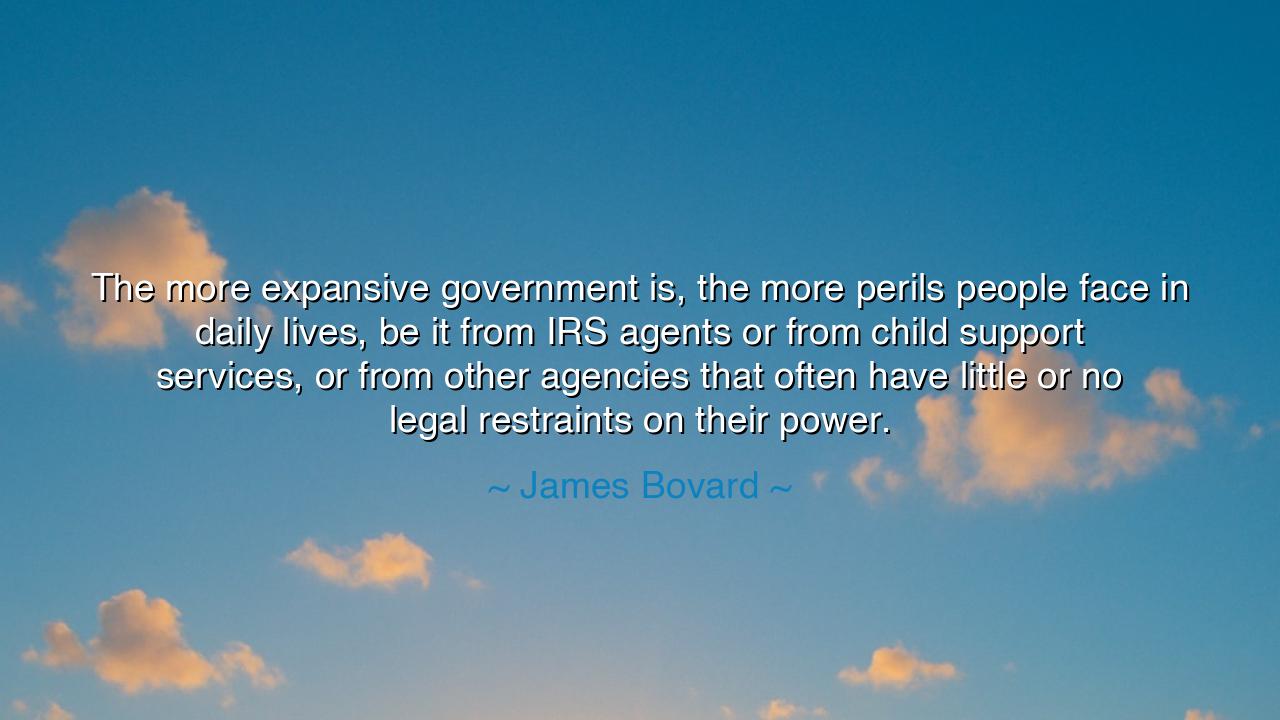
The more expansive government is, the more perils people face in
The more expansive government is, the more perils people face in daily lives, be it from IRS agents or from child support services, or from other agencies that often have little or no legal restraints on their power.






When James Bovard wrote, “The more expansive government is, the more perils people face in daily lives, be it from IRS agents or from child support services, or from other agencies that often have little or no legal restraints on their power,” he spoke with the voice of a sentinel warning his people of a danger not born from invasion, but from within. His words are a cry for vigilance — a reminder that power, though created to serve, has a nature that seeks to expand, and in its expansion, it can begin to ensnare the very citizens it was meant to protect. This is not the voice of rebellion, but of remembrance: that every empire, every nation, every republic must guard against the slow, creeping reach of authority unrestrained.
The origin of this quote lies in Bovard’s lifelong critique of government overreach, particularly in the late twentieth and early twenty-first centuries, when bureaucratic power in America had swollen into a vast machinery touching every corner of life. Bovard, a writer and libertarian thinker, sought to expose how bureaucracies, though built with noble intent, often become self-perpetuating systems of control — entities that operate beyond the reach of accountability, inflicting harm not out of malice, but out of indifference and excess. His warning reflects a truth long understood by philosophers and historians alike: that as government expands, freedom contracts.
The ancients, too, knew this danger. In the republic of Rome, the Senate once ruled with deliberation and restraint, balancing power among its citizens. But as the empire grew, so too did its administrators — tax collectors, soldiers, and magistrates — until Rome became suffocated by its own governance. What began as a system of law became a web of decrees; what began as protection became surveillance. The historian Tacitus, in words that echo Bovard’s centuries later, lamented that “the more corrupt the state, the more numerous the laws.” Bovard’s modern reflection is but an heir to this eternal truth — that when legal restraint gives way to unchecked regulation, liberty perishes not with thunder, but with the quiet turning of a bureaucratic wheel.
In his imagery — “IRS agents,” “child support services,” “agencies with little or no legal restraints” — Bovard names not villains, but symbols of how even lawful authority can drift toward tyranny when it is detached from justice. The IRS, for instance, represents the power to seize what one has earned; child support agencies represent the power to dictate the most intimate bonds of family. Each began with good intention — to collect revenue, to protect children — yet each, when untethered from moral and legal boundaries, can become an instrument of oppression. Bovard’s message, therefore, is not an attack on government itself, but a plea for limitation, for the humble remembrance that power must always serve man, not rule him.
This theme finds a living parable in the story of King George III and the American colonies. What began as governance from afar — taxes for protection, regulations for trade — grew into domination. The colonists, burdened by laws they had no voice in shaping, saw the transformation of law into chains. From their suffering came the Declaration of Independence, not as a cry against all authority, but against authority without consent. Bovard’s warning is the echo of that same spirit — that even democratic institutions, if left unguarded, can slide into the same arrogance once embodied by kings.
But his words also carry a note of moral responsibility. For it is not enough to curse the growth of government; the people must also resist the temptation to surrender their freedom in exchange for comfort. As governments expand, it is often because citizens invite them to — asking the state to solve their problems, to manage their risks, to secure their lives. Yet each time they do, they trade a portion of self-reliance for surveillance, of independence for dependency. Bovard reminds us that the chains of bureaucracy are often forged from the people's own petitions for safety. Freedom, once surrendered piecemeal, rarely returns whole.
Let this, then, be the lesson passed to future generations: that every society must balance compassion with caution, and that laws without limits become instruments of fear. True governance is not measured by the number of its agencies or the reach of its regulations, but by its fidelity to justice and its respect for the dignity of the individual. The people must remain ever watchful, for the line between protection and oppression is thin and easily crossed.
And so, remember the wisdom of Bovard: when government grows beyond restraint, liberty shrinks beyond recognition. Guard your rights not only from tyrants, but from systems that erode them quietly. Question every new power granted, for once given, it rarely retreats. In the words of the ancients — “Eternal vigilance is the price of freedom.” Let that vigilance burn in every generation, lest the servants of the people become their masters, and the promise of liberty be lost beneath the weight of its own protections.






AAdministratorAdministrator
Welcome, honored guests. Please leave a comment, we will respond soon